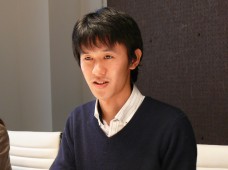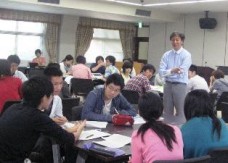2013.07.12
Interview with Kyushu University Vol. 3
A college junior, Akihiro Sato is learning business management at Kyushu University and serves as a leader in the Yunus Social Business Club (YSBC), whose activities are based on SBRC principles. Established in January 2012, the YSBC now has about fifteen participants not only from Kyushu University, but also from the University of Kitakyushu, the Kyushu Institute of Technology, and Kyushu Sangyo University.
The goal of the YSBC is to “Create a Social Business Hub in Japan through the Power of Youth”. It aims to create innovative ideas and train professionals who can fill gaps in existing social and economic systems through effective Social Business practices. The YSBC also works tirelessly to create a nationwide network of youth that includes students involved in Social Business.
According to Mr. Sato, there are three types of YSBC activities. The first one is raising awareness of Social Business as a means to resolve social challenges by building organizational recognition of the YSBC among students. The second is planning Social Business tours in Bangladesh for students and setting up an intern program at Grameen partnership corporations, also planned by the Club. In this way, the institution encourages young students to begin a future career in some form of Social Business. Mr. Sato told me that his involvement in Social Business caused him to think about himself and his future career more seriously than ever.
Last year, the YSBC held a National Social Business Design Contest for students as one of its major activities for the year, with Dr. Muhammad Yunus as an examiner. In preparation for the July 7 contest, the YSBC hosted a series of eight pre-contest workshops to support the competing teams in formulating Social Business plans. The winning team qualified to participate in the Global Social Business Summit (GSBS) held several months later in Wien, Australia. Mr. Sato participated in the Wien summit as a YSBC representative.
A significant portion of the students in the YSBC are considering the UN as a future workplace. However, as Mr. Sato mentioned, participants have yet to go into unknown territory—even to Kyushu University to participate in the United Nations Academic Impact (UNAI). Sato said “our club aims to bring about social changes, including poverty reduction, through Social Business. In other words, we share one goal—what the Millennium Development Goals (MDGs) aim for. I truly hope that we can work together with UNAI to achieve our shared purpose”. Participating in the Wien summit impressed upon Mr. Sato the significance of connecting young people around the globe and having them put their values as well as their cultural and social differences aside. The power to change the future lies in the creativity of the young generation. I truly think that we should focus on the fresh ideas and efforts of young people like Mr. Sato, who are willing to bring about positive change in the world.
* *** *
最近の記事
-
2024.05.20
国連中央緊急対応基金の気候行動アカウント:気候危機に直面する人々とコミュニティーを支援(UN Chronicle 記事・日本語訳) -
2024.05.16
国際反ホモフォビア・バイフォビア・トランスフォビアの日(5月17日)に寄せるアントニオ・グテーレス国連事務総長メッセージ -
2024.05.08
世界報道自由デー(5月3日)に寄せる アントニオ・グテーレス国連事務総長メッセージ -
2024.05.08
エネルギー移行に不可欠な重要鉱物のバリュー・チェーン全体にわたる公平性、持続可能性、人権に取り組むパネルを国連が招集(2024年4月26日付プレスリリース・日本語訳) -
2024.05.08
ある日本の町、資源循環型社会への道をひらく(UN News 記事・日本語訳)
























